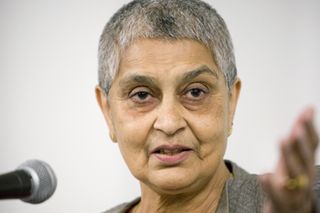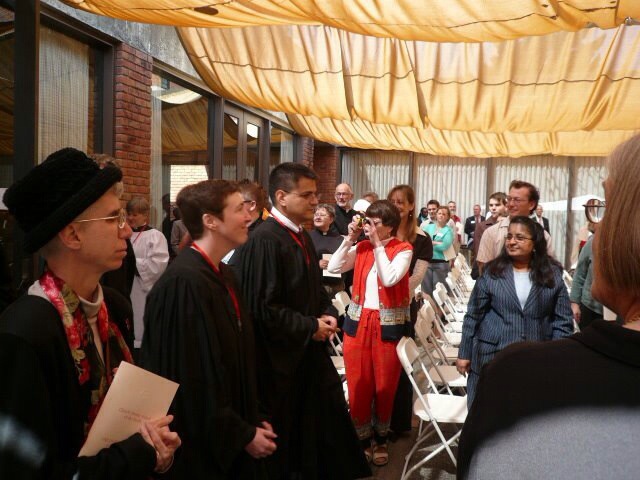In less than a month I will have the distinct pleasure of delivering the Keynote Address before the Annual Meeting of the Institute of Foreign Languages, held this year in Podgorica, Mongenegro (http://www.isj.ucg.ac.me/ICIFL5.htm). This in itself is a great honor. But the real honor is the subject of that address: the amazing Gayatri Chakravorty Spivak’s “Can the Subaltern Speak?”

It is already more than twenty years ago when I first encountered Professor Spivak’s writing in a course taught by Leora Auslander on methods in historical research. At the time I was completing my doctoral research at the University of Chicago and I am certain that I did not fully appreciate Professor Spivak’s contribution. Reading the work again now twenty years later, it is clear that Professor Spivak was light-years ahead of anyone else at the time; or very nearly. Today we have slipped even further down the embankment to which Spivak called our attention back then. Forgetful of the social formation that constituted both our world and the world of the subaltern — forgetful that is of capitalism — we have tolerated and even abetted the drive to rid our institutions, our syllabi, and our curricula of all but the most insipid traces of the violence under whose cover we are still permitted to speak at all.
This permission, in fact, has prompted a not entirely benign rumor to circulate in Bosnia and Herzegovina that I am in fact a spy for the State Department or the CIA, my Marxist credentials only a convenient cover for my true intentions: to infiltrate and report back to the US about the public and published minutes of Plenum and its radical leaders. Without doubt I am here at the State Department’s leisure. And like innumerable Fulbrighters before me my credentials are far to the left of those who selected, funded and sent me.
Nevertheless, these facts should not be permitted to overshadow the inconvenient truth that I am permitted — no, I am invited, urged, compelled — to speak in Mostar, Banja Luka, Sarajevo, Zenica, and Tuzla, at Medresa and English Departments, at Economic Conferences and the Six O’Clock News, while countless more deserving and more articulate voices are silenced. Which is why, whenever I speak, I try as much as possible to remember Professor Spivak and the wonderful spanking she gave to Michel Foucault and Gilles Deleuze twenty-six years ago.
But, of course, over the course of these twenty-six years it has gotten so much worse. If students at UC Berkeley pack my courses to overflowing, it is in large measure a sad commentary on what counts as scholarship in the other lecture halls. We must feel the walls closing in on us, narrowing and constricting what we can think and what we can say. Yet it is only as we reflect critically on the constraints imposed on human knowledge, on the ways that the world we live in shapes what we can think, that we might be provoked to also think critically on what we might be able to think under a different set of constraints and not as is now frequently thought in the absence of constraints entirely. Exposing how capitalism and how imperialism have shaped, for example, my many invitations to serve as MC at conferences over whose subjects I enjoy only ephemeral and passing knowledge, is significant because it reminds us that access and speech are gendered, monetized, and cultivated. But to not point this out, to fail to make this my privilege a point of study, is to naturalize them in ways that damages knowledge and learning itself.
I am still forming my thoughts on Professor Spivak and am not sure how I will pitch this subject at a conference whose attendees, like me, enjoy the privilege of speech. What I want is an uprising within departments and institutions and states against capital on behalf of those who as yet have been silenced and for whom I cannot yet speak. But I need to think with sufficient care if I am not to join Saints Michel and Gilles on Professor Spivak’s whipping block. Beware you know I will.
Month: May 2014
The Post-Fordist Seminary
As I read my friend Dan Joslyn-Siemiatkoski’s Facebook account of graduation at Church Divinity School of the Pacific (CDSP), I am brought to reflect on how CDSP and how the Graduate Theological Union (GTU) has changed since 1998 when I oversaw the accreditation of the GTUs nine seminaries and (at the time) twenty-one centers and independent research units. My office was situated on the second floor adjacent to the President’s office, whom I also served as special assistant. The Graduate Theological Union Library, the premier library of its kind, housing collections from all nine seminaries, also served the community of the University of California, Berkeley, whose charter specified a working relationship with an ecumenical and multireligious research facility — the GTU.
Until the 1990s, the GTU had operated on what could be called Fordist assumptions. It aimed at further integrating its faculties and campuses, closer ties among its many religious communities, active recruiting of new seminarians from underserved communities, expansion of its faculties to include more women of color, expansion of student housing so that students short on means could live comfortably in one of the most expensive rental markets in the country, expansion into the Pacific Rim, and deeper institutional collaboration among the boards and administrations of the GTUs many interdependent institutions. There was only one problem: resources. But with the many deep-pocket corporate executives sitting on its board, relationships assiduously cultivated by then GTU President Glenn Bucher, it seemed completely realistic that a pitch for further expansion and confessional integration would hit its mark.
But then, shortly after we issued our self-study and were awarded full ATS/WASC reaccreditation, there was a general house-cleaning at the GTU. There were good reasons for this house-cleaning, although the manner in which it was accomplished by John “the Axe” Dillenberger, the Interim President, left much to be desired. Glenn’s expansive institutional vision was replaced by parochial self-protection and contraction; and all at once the GTU was faced with the realities of post-Fordism: smaller, more flexible, temporary, transportable, more responsive to share-holders, but far (far) less responsive to stake-holders. To fit the new circumstances, President Bucher’s successor was not an icon of ecumenism, but a congenial and parochial Jesuit, eager to protect the private interests of each of the GTU’s separate institutions, but lacking the corporate connections that might have helped fund the coming generations of interreligious instruction.
Initially, of course, there was significant push-back from those in the GTU who continued to believe that the future should be filled with more, not less cooperation, not further contraction, but expansion of the ecumenical and interreligious vision. The library should be expanded. We should build a common campus at the intersection of Le Conte and Scenic. Cross registration among the seminaries and research institutes should be made more robust. Housing should be expanded. Aid for students and faculty, not just bricks and mortar, should be expanded. We should bring our tuitions more into line with our colleagues back east at Chicago, Yale, Harvard and Princeton. The GTU, gateway to the Pacific.
But over the course of the decade, as I moved on to teaching at Berkeley and my wife began her seminary instruction at CDSP, students, faculty and administrators all began to change their tune. Smaller and more stream-lined was better. Smaller, more flexible faculties featuring more contingent, temporary instructors were a good thing. And since we cannot offer full scholarships to seminarians any longer, or offer them free housing like our colleagues back east, we need to start offering more evening and weekend courses, more commuter opportunities, more online classes. But instead of framing these choices as responses to the overall economic downturn, neoliberal economic policies designed to increase institutional efficiencies and squeeze more out of less, members of the GTU community framed these choices as responses to the changing character of the religious communities that they served. Apparently parishioners did not want their seminaries to hire professors earning a living wage; apparently parishioners did not want their seminarians to be awarded stipends or housing so that they could devote themselves to their studies rather than to work-study. This was not a response to the economic downturn or to the prevailing neoliberal economic philosophy. It was a response to the increasing flexibility of the religious community, the increasing flexibility of the spirit; not to be mourned, but rather to be celebrated.
The GTU Library will soon be closed. CDSP’s faculty has been pared down to eight, mostly part-time or shared posts. Dan Joslyn-Siemiatkoski has accepted a permanent, full-time post at the Seminary of the Southwest in Austin, Texas.
My family and I live two blocks away from CDSP and from the GTU. We have been living in Bosnia and Herzegovina for the past year: Exhibit A in what happens to institutions under the conditions of post-Fordism. We will return to Berkeley this Fall to a GTU and CDSP much changed from the institution we left a year ago. When we return I expect that we will hear reports of what the spirit is doing at the GTU and CDSP, about how God is moving in mysterious ways. Few or any are likely see in this train of events evidence of a quite different spirit: the spirit of capital.

